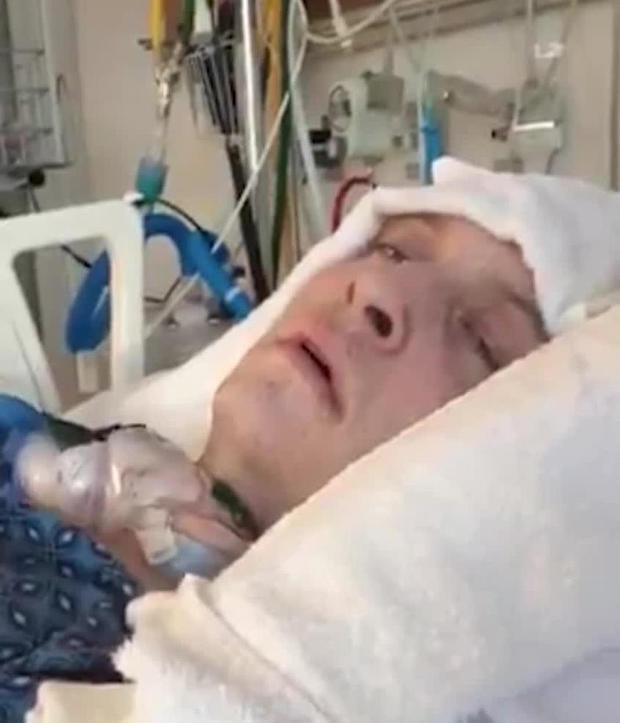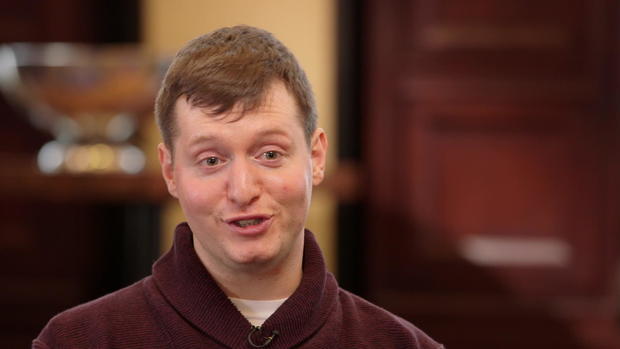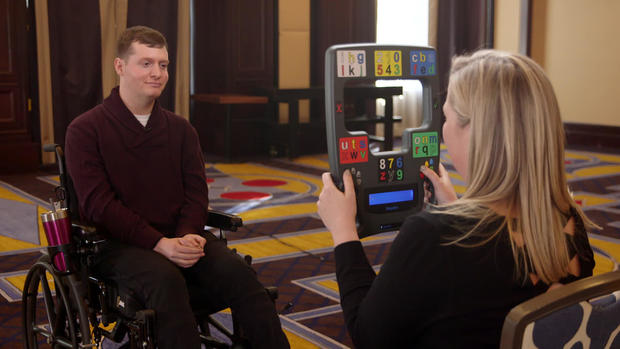When 28-year old Jacob Haendel was rushed to a Massachusetts emergency room four years ago, doctors thought the one-time chef, as young as he was, was having a stroke. But he wasn't; his scans showed something very different, and very strange: Jake's brain seemed to be unplugging itself from the rest of his body.
"The wires weren't sending signals from place to place," said Dr. Brian Edlow, who examined Haendel in the ICU. He wasn't sure at first what was causing it, until Haendel made a confession. He told him he partied hard, and that included doing drugs – opioids, mostly – until he turned to street heroin.
Haendel's medical team surmised he probably ingested a toxin somewhere along the way. That's what was causing the damage, leading to a very rare condition, with a very long name: Toxic Acute Progressive Leukoencephalopathy.
"There are only a few dozen people, since the first report in 1982 of the type of brain injury that Jacob experienced," Edlow told correspondent Lee Cowan.
Within six months, Haendel was little more than a stare; he had ceased any conscious movement. Edlow said, "We believed that he was in a vegetative state, completely unaware of himself or the environment."
He was placed in an extended care facility, where he lay - breathing by machine, fed through a tube, day after day.
Eventually he was put in hospice.
"You know, by Christmas that year, they actually called us, [saying] 'It's over, you know, he's got a couple of days,'" said Haendel's stepfather, Eli Wylen. Not even sure if Haendel could hear him, he went to say goodbye nonetheless.
"I just was whispering to him: it's like, 'It's okay, we love you,'" Wylen said. "You know, 'You don't need this pain anymore,' and just, you know, 'It's okay to go.'"
Of that conversation, Jake said, "I'm like, 'I appreciate that. But, no.'"
Haendel didn't die that night, or the next, or the one after that. Instead, his brain somehow sputtered back to life. His doctors still aren't sure how.
"There are very few people like Jacob who have ever been described in the medical literature," Edlow said.
Haendel told Cowan, "It's a crazy story. It's hard for me to believe this story sometimes. If I was where you're sitting, I'd be like, 'No, like no, that didn't happen.'"
His remarkable recovery started really almost by accident, or fate maybe, when a doctor happened to notice a tiny movement in Haendel's wrist – a mere twitch. Some thought it meant nothing, that it was involuntary, but his family thought otherwise.
Cowan asked Wylen, "Were you optimistic? Did you think he was going to get out of this?"
"Optimistic might be too strong a word. Hopeful, maybe?" he replied.
But it's what happened a few weeks later that really stunned everyone. Haendel started moving his tongue and his eyes, almost imperceptibly at first, but enough to use a letterboard to spell out a message he'd been desperately trying to send for almost a year: "First thing I said was, 'I can hear you.'"
As the words slowly appeared, doctors realized that Haendel hadn't been unconscious for the past year; he wasn't blissfully unaware of his descent into nothingness. Instead, he had actually been awake the whole time, locked inside a coffin that was his own body.
"I couldn't express anything to anyone. No one knew what was going on in my head, and I just wanted someone to know, like, that I was in there."
Edlow said, "To go through all of that, being fully aware and having others not realize it? I can't even imagine the feeling of isolation, or the sensation of fear that one might experience. It's truly humbling, to think about how little we understood his brain function at that time."
For months he was silently trapped somewhere between living and not-living. As time wore on, he noticed that the visits began to slow. He heard nurses calling him brain dead. He even remembers being giving last rites.
Cowan asked, "Did you feel alone?"
"Uh-huh Yeah, I very alone. I talked to myself, a lot. A lot. There were times where I was like, 'I've had enough. I can't do it.' But I would always make it to the next day. I'm like, 'Okay, carry on.'"
On top of hearing everything, Haendel could feel everything, too: "I was, like, 'Ugh, this is the worst because I had so many needs and I was in so much pain, and I couldn't even tell anyone I need help, like, 'My mouth is dry,' or like, 'I'm hungry,' or 'I love you,' or 'Don't worry.' These were the hardest things."
To pass the time, he would do math problems in his head just to help keep himself from the guilt that his drug use has caused all of this. "And the doctors kept saying, like, 'This is so rare, it's not your fault.' And I'm like, 'That's a nice thing to say, but I caused this.' Like, damn. I definitely had a big feeling of how disappointed my mother would be in me."
Haendel's mom died of breast cancer when he was just 19. She had a long, miserable fight. Haendel started using drugs to escape, and to cope. "I was so unhappy, that I was not thinking about the future. Everything was, like, falling apart. I weaned myself off. I'd gotten myself off."
"You tried to quit?" Cowan asked.
"Oh, hundreds of times. But always kind of, like, slipped up again."
Haendel was still lost in that fog as he began to recover.
Michelle Braley, Haendel's speech language pathologist, was helping him learn to speak again, but early on, the words that came out screamed of a mental anguish that made her just as much a counselor as a pathologist.
"He would say, you know, 'Do I deserve this? Am I gonna have to live like this the rest of my life because of the mistakes that I made?' Those were the types of conversations," Braley said.
"And how did you answer?"
"It's really hard. Well, the answer is, 'No, you don't deserve this.' I mean, that's the answer. Nobody deserves this."
It wasn't just speech he had to relearn. It was everything. His muscles had been frozen for so long, even the slightest movement was excruciating. But bit by bit, through months of work at the Spaulding Rehabilitation Hospital in Boston, Haendel's body starting to function again – putting on shoes, buttoning buttons, all things he never thought twice about before.
His cousin, Kim, even helped him to get back to cooking again, cracking eggs and cracking himself up at the same time. Using a pepper mill, Haendel said, "For someone that has no coordination in their brain apparently, not bad!"
He's gotten his own apartment, where with help he's returning to a life without drugs, and without the self-doubt and grief that put him into that spiral in the first place.
"I don't particularly think there's anything super-special about me per se," he said.
"You really don't?" asked Cowan.
"Anybody has the capacity to do this, if they have the will power."
But that's the thing: not everybody has Haendel's will power, and very few have survived literally being scared to death and come back with such a profound understanding of what a second chance really means.
"I am an improved Jake," he said. "And I'm a happier Jake. I don't want to give up."
For more info:
Story produced by Sari Aviv. Editor: Steven Tyler. Illustrations: Mitch Butler.
"how" - Google News
July 25, 2021 at 08:10PM
https://ift.tt/3eTbKlo
Surviving locked-in syndrome: How one man confounded expectations of death - CBS News
"how" - Google News
https://ift.tt/2MfXd3I
https://ift.tt/3d8uZUG
Bagikan Berita Ini


















0 Response to "Surviving locked-in syndrome: How one man confounded expectations of death - CBS News"
Post a Comment